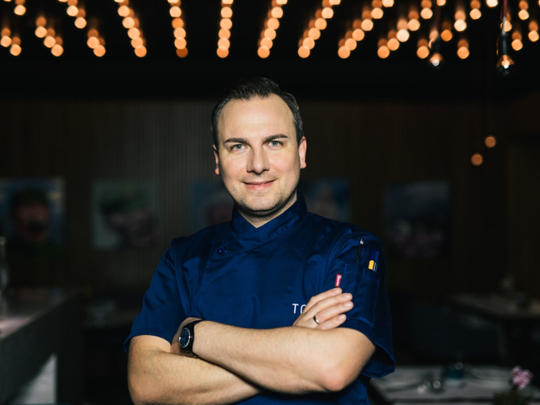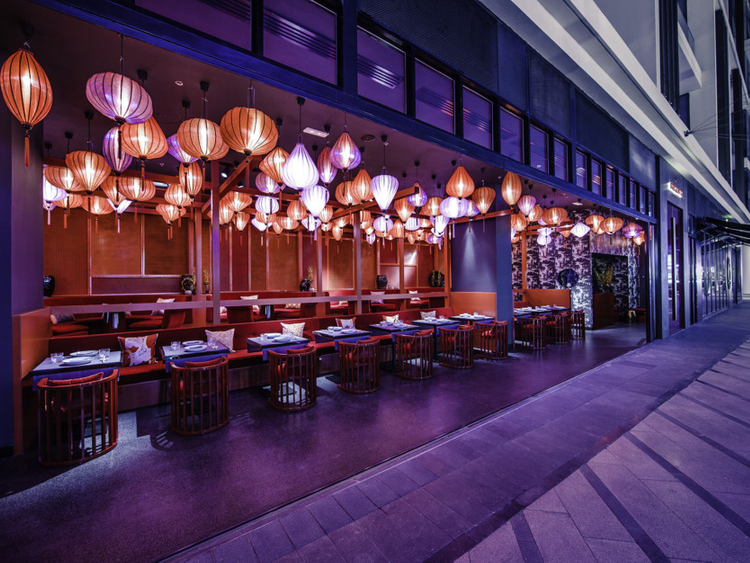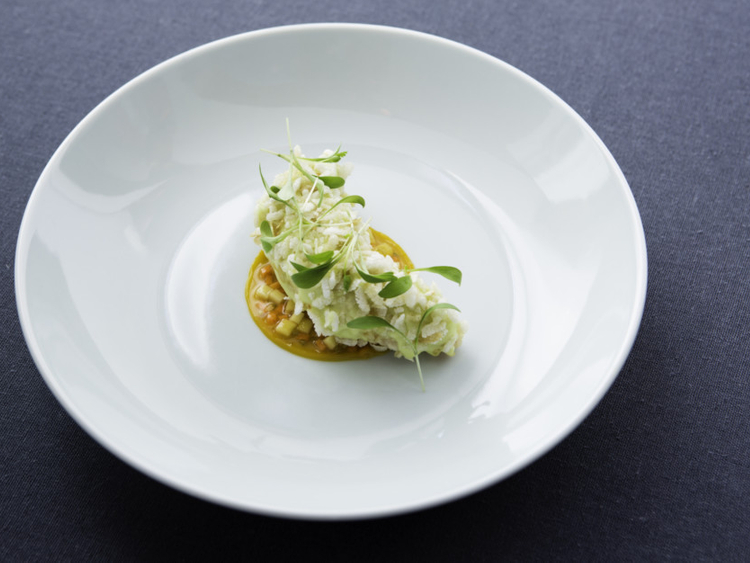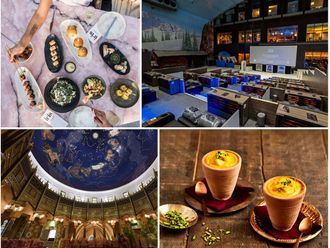
Last week between bites of succulent wasabi langoustine, flaky turbot cooked Canton style, crispy Peking duck and delicious mango and sticky rice, German chef Tim Raue took Gulf News tabloid! on a delectable culinary journey through his just-opened Dubai restaurant, Dragonfly, at City Walk.
Served with jines — non-alcoholic juices that are presented as wines (only at Dragonfly) — the dishes are “one-to-one copies” and on a par with those served at his two Michelin-starred restaurants, also called Tim Raue, in Berlin. These are modern reinterpretations of authentic Asian recipes.
When you meet Raue, the first thing you wonder is why a European chef would want to ace Asian cuisine. But it really doesn’t bother him.
“Inside I feel so Asian. I had grown up in one of the poorest parts of Berlin with lots of Turkish and Arab people. That makes me feel really free,” he said. “Between 2003 and 2008 I was the global culinary adviser with Swissotel and Raffles hotels, and was based in Singapore. They sent me to Asia [because they believed] that white men can give more structure, more profit. When I arrived there I thought it’s stupid because they do five times more profit than we do in Europe. The Singaporeans, Malay and Indonesians [I met there], brought me to their places and I loved the social thing of sitting together and sharing food. That’s something we don’t have in Germany. We [always thought] that good food was French fine dining with stiffness, attitude — I never liked that. That’s when I thought why don’t I do it too?”
There’s was no looking back from there. Raue set out to learn Chinese, Japanese and Thai cuisines. From this first visit to Singapore and Hong Kong he felt he needed to do something different. In three-and-a-half years, he learnt to balance bold Thai flavours; study the thought behind Japanese being “fancy and crazy” about the quality of their food; and understand the “ease and yumminess” of Chinese, Cantonese and Schezwan food.
“So I started creating my own ideas. But it was in 2007 when I was awarded chef of the year and got my first Michelin star, I knew I was finally ready to step up. I was cooking food that was, like, Spanish avant garde, French, German influenced, [and some with] a touch of Asian in flavour. The day after I won the award I thought if I can get such high honour for this nearly [expletive] work that I’m doing now I have to turn it around and do that which I feel passionate about”.
The following year he left the company he was working with because they didn’t share his values about food. In 2010 he opened his restaurant Tim Raue with his business partner Marie Anne and it took off brilliantly. Three months later the restaurant received its first Michelin star and in 2012 its second one. He went on to open others including La Soupe Populaire, which serves German food — recipes Raue’s grandmother cooked — despite its French name, and Sra Bua, a contemporary Asian restaurant.
Even though all his restaurants offer fine food, Raue insists everyone is welcome, even if they are not all dressed up.
“Ten years ago if you went to a Paris or London fine dining place you [had] to wear a suit and tie. I think if someone tells you what you have to wear to eat somewhere, that’s not part of going out. Of course, sometimes it’s nice to dress up but it shouldn’t be a must. We don’t care if someone came in flip-flops, shorts and T-shirt or a cultural look if they want. We just want people who are really interested in the food as long as they can pay at the end of the meal”.
And the same applies to his first Dubai restaurant, which came about when Meraas [developers of City Walk] representatives saw him at a chefs’ symposium in Netherlands.
“My Dubai partners thought that’s a chef who can cook really serious [food] but in an environment that’s not fine dining style. For me, Dubai is a marketplace full of foodies so I decided to try it. Dubai is pretty interesting because here people are really seeking great food and, on the other hand, they don’t really want to have stiffness or attitude when they go to a restaurant”.
It took them two years to set up Dragonfly but Raue said he wanted a different feel for it from his other restaurants. However, the difference lies in the design, said the 42-year-old. Designed as a theatre with two levels, each table has a view of the boulevard without blocking anyone’s view. Even the French doors can be completely slid open so that those inside also get a feeling of dining alfresco.
“In Berlin, it’s more blue, more Japanese. Here we made it a bit Chinese, because with a Japanese [concept] everyone thinks of sushi, and we don’t do sushi,” said Raue. “As for the food, we avoid any kind of starch products. We don’t use noodles, rice, potatoes and are absolutely gluten free, lactose free, and try to avoid sugar. It’s a kitchen that really likes to play with flavours which are light and give you energy.
“We may not have a view like, say, Pier Chic or are not on a rooftop. But here you should feel you can take a short journey to Asia through your plate and forget what’s outside — the stress and the pushiness that Dubai has for working people. You can rest and be inspired by the food because it is a mix of art and craftsmanship. It is craftsmanship to make the langoustine so juicy and rich but it’s an art to pair all these flavours and make the dish outstanding”.
However molecular gastronomy is not for him, Raue says.
“Look at me — I’m not a foam. The only thing we use is dry ice because we need to show the steam [in the Canton-style steamed turbot]. Everything on the plate is what it is. Like me, it’s authentic, straightforward,” he said laughing. “Cooking for me is the best way to express myself. When you send the plate out you should be happy with it and then let it go and not bother about what every single person feels. If you started taking every [piece of] feedback seriously, you’ll become subjective”.















